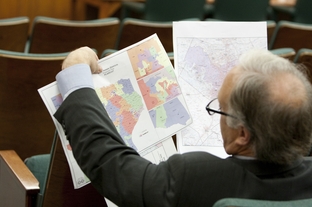In the Map Rooms

The Justice Department didn't find fault (put an asterisk here) with the Senate and State Board of Education redistricting maps from Texas, but told a federal court in Washington, DC, that it thinks the maps for the congressional delegation and for the Texas House go backwards in minority representation.
The asterisk is this: DOJ didn't say it approves of the maps or thinks they're legal. It means those two maps don't set off alarms for retrogression — the term for a map that cuts into minority voters' ability to elect the candidates they want to elect.
The DC court will decide whether the Texas maps meet that standard in the federal Voting Rights Act. In fact, they decided late Thursday to pre-clear the SBOE map, saying that it doesn't trip the Section 5 provisions and should be allowed to take effect immediately.
The DC court also told the lawyers to turn in lists by the end of the week naming the House and congressional districts that allegedly violate the law. Here's a troublesome note, if you're a candidate who wants to get this wrapped up in a hurry: Among the various deadlines set out by that court is an Oct. 31 date by which the state has to file its responses. That likely means a November trial. Candidate filing starts on Nov. 12. When that sort of thing happens in a newsroom, everybody knows there's a blown deadline ahead.
Meanwhile, the San Antonio federal judges who finished their hearing last week will decide on other issues, such as whether the new maps reflect — in political terms — the growth in the state's minority population. Just over 10 percent of the state's growth over the last decade is attributable to Anglos; the rest was due to growth in the Hispanic and Black populations in Texas. Several of the groups suing to overturn the maps say those groups should have better representation.
There's a new lawsuit to that effect, filed by a group that includes Sen. Wendy Davis and Rep. Marc Veasey, both Democrats from Fort Worth, who say the new maps don't fairly represent minorities in Tarrant and Dallas counties. They contend that it violates both the Voting Rights Act and the Constitution. That will go into the San Antonio pile of lawsuits.

